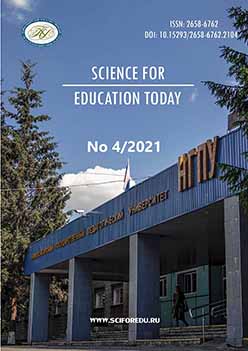Оценка эффективности программы коммуникативно-личностного развития младших школьников в условиях научно-инновационного партнерства школы и вуза
The program of communicative and personal development of primary school children within the framework of an innovative university-school partnership: Evaluation of the effectiveness
Author(s): Yulia Valerievna Batenova, Marina Yuryevna Buslaeva, Marina Nikolaevna Tereshchenko, Nadezhda Borisovna Novikova, Sergey Vladimirovich Tipushkov, Oksana Gennadievna FilippovaSubject(s): School education, Higher Education , Hermeneutics, Sociology of Education
Published by: Новосибирский государственный педагогический университет
Keywords: Communicative and personal development; Primary schoolchild; Communicative skills; Speech culture; Language personality; Productivity of communication; Social and communicative experience;
Summary/Abstract: The article addresses the problem of primary schoolchildren’s communicative and personal development within the frameworks of an innovative university-school partnership. The purpose of the article is to evaluate the effectiveness of the program aimed at communicative and personal development of primary schoolchildren and to identify psychological and educational factors contributing to its implementation. Materials and Methods. The research follows learner-centered, semiotic, and hermeneutic approaches. In order to assess communicative development of primary schoolchildren, the following empirical methods were used: G. A. Zuckerman’s ‘Mittens’ inventory, O. G. Mishanova’s ‘Polite words’ inventory, G. A. Zuckerman’s ‘Dictation Pattern’ inventory, the ‘Brothers and Sisters’ method (modified samples of Zh. Piaget). The study involved 50 primary schoolchildren and 4 primary school teachers. To analyze the empirical data and evaluate the dynamics, the Wilcoxon T-test was used, which ensures the validity and reliability of research findings. Results. The article analyzes and summarizes the experience of currently available programs aimed at social and communicative development of primary schoolchildren. The authors have developed a program enhancing primary schoolchildren’s communicative development, theoretically justified and implemented it. The explanatory and heuristic potential of methodological principles and approaches to solving this problem has been revealed. The authors describe an educational technology called ‘a hermeneutic circle’ and illustrate it by means of a text analyzes focusing on its expediency, relevance, and communicative significance for effective cognition of the language essence and training communicative skills. The research findings indicate the effectiveness of the program called ‘Culture of speech and ethics of communication’ in the communicative and personal development of primary schoolchildren in four areas: communication as cooperation; communication as management; communication as interiorization; communication as interaction. Relying on these directions, the authors have identified and described the following parameters of the integral communicative and personal development: the level of dialogic communication, the level of communication ethics, the level of communication productivity, the level of understanding of the other participants. Conclusions. The article concludes that the implementation of ‘Culture of speech and ethics of communication’ program and creating a psychologically beneficial learning environment have led to a high level of communicative and personal development of primary schoolchildren who consider language as a cultural, ethical, and aesthetic value.
Journal: Science for Education Today
- Issue Year: 11/2021
- Issue No: 4
- Page Range: 7-32
- Page Count: 26
- Language: Russian

